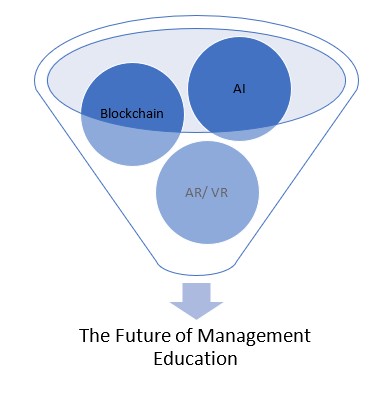Dr. Tuhin spent the first 10 years of his career in academia and research, teaching business statistics, analytics, and technology at several reputed B-Schools of India. Subsequently as a corporate practitioner, he has a proven record of accomplishment as a transformational leader in organizations like The Nielsen Company and worked extensively in NA and S-E Asia. Currently, he runs his own consultancy for providing a full suite of AI, analytics, CTO/CAO as-aService, and digital transformation services to clients besides teaching at JAGSoM.
Gone are the days when management education is imparted through the books, lectures, slide deck and case studies. With the advent of revolutionary technologies like AI, blockchain, AR and VR, the science and art of delivering management education is undergoing a paradigm shift among the leading B-schools across the globe. Student empowerment is the underlying philosophy in triggering this technology driven change. Earlier it was only a one-way traffic from the teachers to the students through multiple channels of transferring the knowledge. Presently, the tools and technologies of digital transformation offers an ecosystem to the students that not only connects them with multiple stakeholders but also gives them an immersive experience which helps to shape student’s perspective towards management education and career. The digital transformation of management education is driven by a suite of leading Industry 4.0 technologies like cloud computing, analytics, Artificial Intelligence (AI), machine learning, blockchain, and Augmented Reality (AR)/ Virtual Reality (VR).

AI in Transforming Management Education
AI augments the quality of management education through mass-customization, conversational education, gamification, simulation, and VR.
| Mass-Customization | One approach of delivering a course doesn’t fit all the students in clarifying a concept. While it’s impossible for a human teacher to customize the content for every student, AI helps in mass customization of the content and its delivery keeping in sync with the interest, passion, and the learning curve of each student. |
| Conversational AI | Conversational AI powered by Natural Language Processing (NLP) and Natural Language Generation (NLG) can interact with the students 24/7 either through voice or through chatbots. |
| Gamification | Gamification of the content powered by AI and VR aims to provide an exciting playground for the students where they actively engage with the content and take quick decisions to generate scores through a healthy competition with fellow learners across the globe. |
| Simulation | Simulation of diverse extreme scenarios equip the students with the skills to take managerial decisions and assess the impact of their decisions on the organization as well as on the macro environment. |
| Virtual Reality (VR) | The VR platforms provide an immersive experience to the students where they can attend the board meetings, negotiate with the stakeholders, interact with the customers, and address the operational challenges well before they set their feet on the real world. |
Blockchain in Transforming Management Education
Smart contracts, steered by blockchain technology, bridges the gaps among the stakeholders of management education by collaboration and transparency.
| Collaboration | The distributed ledger platforms of blockchains provide a unique opportunity for the recruiters, students, and the management institutes to seamlessly integrate for a better fitment of the student talent with the right industry requirement. |
| Transparency | The blockchain platforms provide the much-needed transparency and authenticity of all documents including certificates/ projects that can easily be verified. |
| Smart Contracts | The smart contracts give complete visibility to the actions of the recruiters and the students, and all the financials involved among the stakeholders can be better monitored. |
Stackable Credentials
Stackable credentials powered by the edtech platforms dramatically transforms the distribution and consumption of management education. Students can learn in smaller chunks as per their need to stack them together in contrast to a modular learning that leads to a degree or diploma which consumes a good amount of money and time. The key benefits of stackable learning are summarized below.
| Affordability | Saves a significant amount of cost in comparison to degree programs |
| Convenience | Working professionals need not quit the job to educate themselves. A skill can be learnt at any of the convenient hour of the students. |
| Continuous Improvement | Stacking credentials prove to be the perfect pathway for continuous learning and improvement |
Management institutes these days are offering stackable credentials with flexible schedules and programs that can land a student to a specific job. They can always come back for a full degree program if they want to enrich their knowledge further at a later stage when the credits earned through their earlier credentials will be considered. The Stackable Credentials Pathways would be further enriched through collaboration, industry acceptance and partnership.
| Collaboration | Inputs on the in-demand skills from the industry would help the academic institutions launch the right program catering to an immediate need |
| Industry Acceptance | A transformation of the mindset is equally critical where a candidate with a desired skill set would be accepted based on the stacking credentials |
| Partnership | Management institutes can train the industry on a specific skill set as and when they require it with a partnership in place |
It’s an era of Massive Open Online Courses (MOOCs) which give access to quality management education by making the courses affordable to all. It’s high time for the management institutes to leverage the power of technology in enriching their offerings that would create key differentiations in the already crowded space to make their existence all the more relevant.


